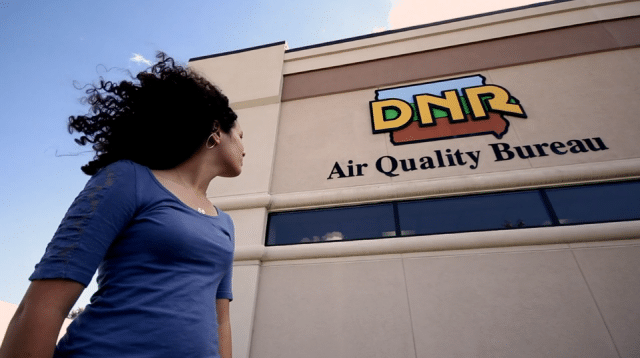Should the atmosphere be considered part of the public trust, a resource essential for our collective survival? An Iowa judge, for one, thinks that there is good reason and precedent.
You may recall the story of a group of kids, working together with Our Children’s Trust, who are suing the federal government and various state governments to ensure that the atmosphere is protected under the so-called Public Trust Doctrine. We’ve covered the story of Alec Loorz, who has helped organize the campaign, and who put his name on the suit before the federal government. Similar suits have been filed in ten states now, including Iowa, where a decision was offered last week in the Court of Appeals.
But before we get to the court’s finding, a quick refresher on the public trust doctrine and the atmosphere’s relation to it. Over the past few years, University of Oregon Law professor Mary Wood has been developing a legal theory around an “atmospheric trust.” As I wrote in that earlier post:
The theory is based on the premise, according to Wood, “that all governments hold natural resources in trust for their citizens and bear the fiduciary obligation to protect such resources for future generations.”
For you lawyers out there, “atmospheric trust litigation” is rooted in the Public Trust Doctrine, an evolution of old British “Commons Law” that has been used successfully in the past to preserve and protect natural resources – like air and water – for public use.
Using this atmospheric trust theory, Glori Dei Fillippone, a 14-year-old from Des Moines, petitioned the Iowa Department of Natural Resources to adopt new greenhouse gas emissions rules, citing the public trust doctrine. The DNR denied her petition, so she sought judicial review. The district court first affirmed the DNR’s denial, and last week the Court of Appeals affirmed that decision.
So on its face, the Court’s decision deals a blow to Fillippone’s cause, but not all the news is bad. One of the judges to hear the case, Judge Doyle, ceded the question to the State Supreme Court, and offered some very lucid support for the idea of protecting the atmosphere as a public trust, saying that there is a “sound public policy basis” for extending the public trust doctrine to include the atmosphere. His comments follow in full:
I concur specially. I agree there is no Iowa case law for extending the public trust doctrine to include the atmosphere. But, I believe there is a sound public policy basis for doing so.
In 1989, in enacting the Resources Enhancement and Protection (REAP) program, the legislature stated:
The general assembly finds that:
1. The citizens of Iowa have built and sustained their society on Iowa’s air, soils, waters, and rich diversity of life. The well-being and future of Iowa depend on these natural resources.
… .
4. The air, waters, soils, and biota of Iowa are interdependent and form a complex ecosystem. Iowans have the right to inherit this ecosystem in a sustainable condition, without severe or irreparable damage caused by human activities. 1989 Iowa Acts ch. 236, § 2 (now codified at Iowa Code § 455A.15 (2013)) (emphasis added). Furthermore,
It is the policy of the state of Iowa to protect its natural resource heritage of air, soils, waters, and wildlife for the benefit of present and future citizens with the establishment of a resource enhancement program. Id. § 3 (now codified at § 455A.16) (emphasis added).
The legislature, the voice of the people, has spoken in terms as clear as a crisp, cloudless, autumn Iowa sky.
[Note: italicized emphasis was added by Judge Coyle. Bold emphasis was added by author. You can read the entire original judgement here (PDF).]
To translate this from legalese (with the help of my wife, a professor of environmental law), the judge is essentially saying that it is sound judgement to protect the atmosphere, but it’s up to the state legislature to make it into explicit law – which it should because it aligns with existing statutes and laws.
Judge Doyle isn’t the first to take this public position. State court judges in Texas and New Mexico made very similar statements in remarks about their respective cases.
Glori Dei’s lawyer, Channing Dutton, has already committed to appeal the decision and take Judge Doyle’s concurrence to the Iowa Supreme Court.
Our courts have never held that the atmosphere is a public trust resource because they have never had occasion to do so…But there is abundant precedent that the air and atmosphere have always fallen squarely within the legal doctrine. Given the threats climate disruption poses to our waterways, our wildlife, our land, and our children it is time the Supreme Court recognizes the atmosphere as a fundamental public trust, on which all of us depend.
While we wait for the Iowa Supreme Court to hear the case, you can check out this very inspirational video of Filippone:
Updated 4/4: On April 2, Filipone officially filed her appeal to the Supreme Court of the State of Iowa. Her lawyer, Channing Dutton, said, “It is fitting that the Iowa appeal was filed the day after Dr. James Hansen, a native of Dennison, Iowa, and the chief science advisor to Our Children’s Trust announced his retirement. Although the legal basis for the lawsuit in Iowa is contested, the Iowa DNR and the Iowa court system have accepted the science on climate change, provided by Dr. Hansen for the litigation, as fact.”
Subscribe to our newsletter
Stay up to date with DeSmog news and alerts






